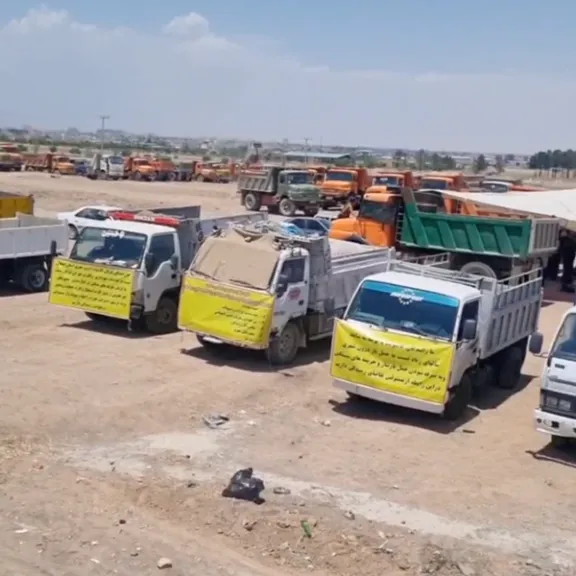Truckers' strike persists as Tehran's steps up arrests

A week into a sweeping truckers’ strike in Iran, the protest appeared to be continuing unabated despite increased arrests by authorities according to sources close to the movement.

A week into a sweeping truckers’ strike in Iran, the protest appeared to be continuing unabated despite increased arrests by authorities according to sources close to the movement.
Initially launched to protest fuel quotas and working conditions, the industrial action has brought freight traffic to a standstill. Videos from Bandar Abbas, Marivan, and the Kahak-Qom highway show deserted routes normally busy with cargo trucks.
Authorities have escalated efforts to suppress the strike with arrests, sources close to the strikers told Iran International, adding that security forces have summoned many drivers and detained some.
The truckers union on Wednesday called for immediate and unconditional release of those arrested, reporting crackdowns in several provinces including Isfahan, Hormozgan, Fars, Kermanshah, Ardabil and Khuzestan.
On Tuesday, the Islamic Revolutionary Guard Corps (IRGC) in Kerman province announced it had dismantled an “organized anti-security network,” though it gave no details or clear link to the strike.
Drivers are calling for better working conditions, higher freight rates, and relief from high insurance costs and fuel restrictions.
IRGC-affiliated vehicles have been spotted transporting goods, in what appears to be an attempt to break the strike.
One citizen who filmed an IRGC-marked truck told Iran International the force was stepping in to cover routes abandoned by striking drivers.
Hard to break
The government faces a logistical and political challenge. Despite efforts since 2018 to increase corporate control of the freight industry—doubling the number of company-owned trucks and drawing figures like Babak Zanjani into the sector—most trucks remain in private hands.
Official data shows that 552,000 drivers operate 433,000 trucks nationwide. Of those, just under 7% (around 30,000) are company-owned, while the rest are controlled by individual owner-operators, many of whom are now aligned with the strike.
The action could be poised to spread beyond truck drivers, with some working for ride share company Snapp voicing solidarity.
In messages sent to Iran International, one driver said he would continue to strike alongside the truckers; another urged colleagues and other professions to join the movement.
Officials announced on Wednesday that a plan to introduce a tiered diesel pricing system was suspended—in appeared to be a government response to a key demand of the strikers.
“All aspects of fuel allocation will be reviewed with the participation of trucker representatives,” head of truckers union Firooz Khodaei said.